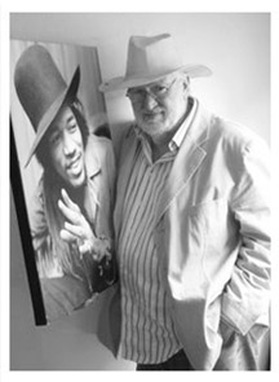The closest I came – physically – to Jimi was a brief period a couple of years later, when I worked in a short-lived advertising agency which had taken over a couple of floors of the house opposite Claridge’s in which he lived and died. And today, amongst the pictures of Dylan and Sartre and Ted Williams on the walls of my office, is a wonderful portrait of Hendrix taken by Bill Zygmant a few days before he died. (You can find out more about Bill and his sensational photographs at www.billzygmant.co.uk.)
I remember that balmy 1970 night outside the cinema in Leicester Square. I was with a university comrade called Phil Geddes, who was subsequently blown up by the IRA in 1983 outside Harrods. We discussed not the movie we had just seen but the importance of Hendrix. The discussion, I recall, focused on the political importance of the man and his music, and the role of rock music in the struggle. At the time, I would have placed more importance on the overtly political bands and on those, such as the Airplane, which were revolutionary both lyrically and musically. And maybe I was a little dismissive of the playing of the guitar upside down, the flames, the smashing of amps and speakers ( I’m pretty conservative at heart)..
I would have been wrong.
But I suspect that is why I did not see Hendrix live. Instead of seeing him, I was probably attending a gig by Edgar Broughton, or analysing each line of A Hard Rain’s Gonna Fall, or organising a demonstration against Enoch Powell or writing an article about the Greek junta.
All worthy activities, but none of them as fulfilling, in retrospect, as seeing Hendrix in person.
My loss.
Today’s listening: Winterland, 12 October 1968. An extraordinary 15 minute Red House is the highlight of one of the great improvisatory gigs of the time.






 RSS Feed
RSS Feed